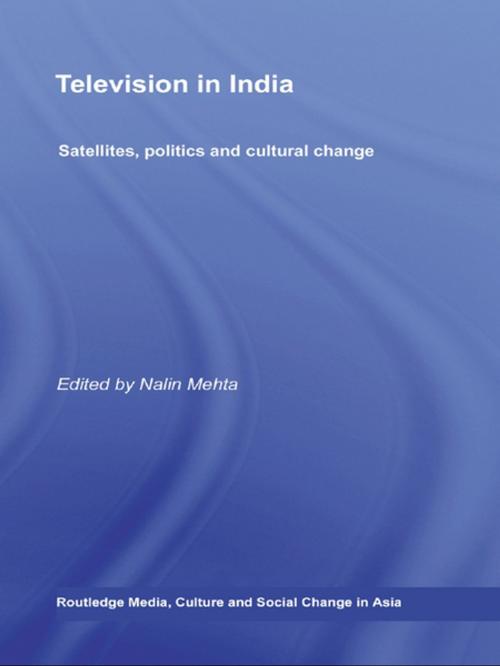Television in India
Satellites, Politics and Cultural Change
Nonfiction, Entertainment, Television, Performing Arts, Social & Cultural Studies, Social Science, Anthropology| Author: | ISBN: | 9781134062126 | |
| Publisher: | Taylor and Francis | Publication: | June 3, 2008 |
| Imprint: | Routledge | Language: | English |
| Author: | |
| ISBN: | 9781134062126 |
| Publisher: | Taylor and Francis |
| Publication: | June 3, 2008 |
| Imprint: | Routledge |
| Language: | English |
This book examines the development of television in India since the early 1990s, and its implications for Indian society more widely. Until 1991, India possessed only a single state-owned television channel, but since then there has been a rapid expansion in independent satellite channels which came as a complete break from the statist control of the past. This book explores this transformation, explaining how television, a medium that developed in the industrial West, was adapted to suit Indian conditions, and in turn has altered Indian social practices, making possible new ways of imagining identities, conducting politics and engaging with the state. In particular, satellite television initially came to India as the representative of global capitalism but it was appropriated by Indian entrepreneurs and producers who Indianized it. Considering the full gamut of Indian television - from "national" networks in English and Hindi to the state of regional language networks – this book elucidates the transformative impact of television on a range of important social practices, including politics and democracy, sport and identity formation, cinema and popular culture. Overall, it shows how the story of television in India is also the story of India's encounter with the forces of globalisation.
This book examines the development of television in India since the early 1990s, and its implications for Indian society more widely. Until 1991, India possessed only a single state-owned television channel, but since then there has been a rapid expansion in independent satellite channels which came as a complete break from the statist control of the past. This book explores this transformation, explaining how television, a medium that developed in the industrial West, was adapted to suit Indian conditions, and in turn has altered Indian social practices, making possible new ways of imagining identities, conducting politics and engaging with the state. In particular, satellite television initially came to India as the representative of global capitalism but it was appropriated by Indian entrepreneurs and producers who Indianized it. Considering the full gamut of Indian television - from "national" networks in English and Hindi to the state of regional language networks – this book elucidates the transformative impact of television on a range of important social practices, including politics and democracy, sport and identity formation, cinema and popular culture. Overall, it shows how the story of television in India is also the story of India's encounter with the forces of globalisation.















